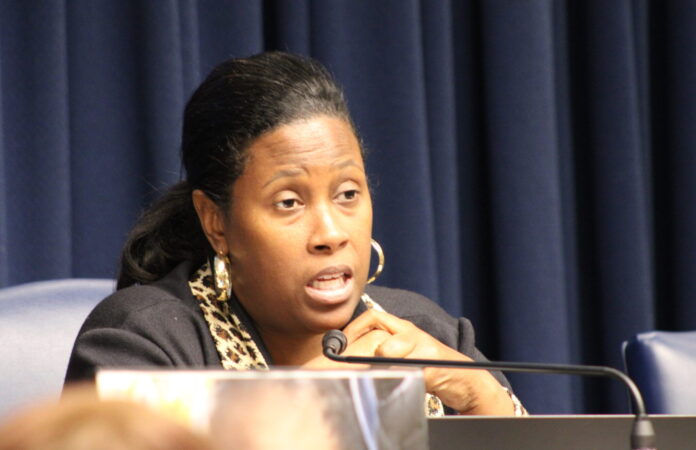Louisiana (3/17/2023) – Long before she was sued for allegedly violating a person’s right to free speech, Sen. Katrina Jackson, D-Monroe, had a history of blocking Twitter users who criticized her. It’s a practice that has caused legal troubles for elected officials in other parts of the country.
In interviews last week, seven people said Jackson shut down their access to her Twitter account after they chastised her on the social media platform. Many have similar political profiles. They are left-leaning Democrats who follow state politics closely and frequently engage Louisiana officials online.
A few said they were blocked after criticizing Jackson for carrying anti-abortion legislation over the years. Though a Democrat, Jackson is one of the Louisiana Legislature’s leading abortion opponents.
“She just does not like criticism. She does not like criticism at all,” said Dayne Sherman, a prolific Twitter user who Jackson blocked about a decade ago.
Sherman and the six other people accusing Jackson of blocking them aren’t part of the lawsuit filed last week against the senator, but their experiences could be used to bolster the plaintiff’s case.
New Orleans resident Maya Detiege and Tulane University’s First Amendment Clinic are suing Jackson for blocking Detiege on Twitter. They allege that Jackson, as an elected official, engaged in illegal censorship of Detiege, who supports abortion rights.
Some of the people blocked are mentioned in Detiege’s lawsuit. The Illuminator reached out others who had publicly complained about Jackson blocking them.
In response to the lawsuit, Jackson has said Detiege was spewing “hate speech” that isn’t protected by the First Amendment. An initial tweet from Detiege to Jackson in June contained profanity.
“I say this with all disrespect: burn in hell. You don’t care about women. You don’t care about pregnant people. You don’t care about children. You don’t care about education. I don’t respect all black women. Some of you bitches are very dumb,” wrote Detiege, a Black woman, about Jackson, also a Black woman, in a tweet.
Later, Detiege was part of a back-and-forth discussion on Twitter with Jackson about whether the senator secured enough funding to offset the impact of the abortion ban. Jackson blocked Detiege after that exchange.
“Do I have to tolerate someone telling me to burn in hell and calling Black women stupid b-i-t-c-h-e-s?” Jackson, a conservative Christian, said in an interview this week.
But other people interviewed said they didn’t lob profanity or threats at Jackson before the senator blocked them.
“I didn’t insult her personally,” said Lamar White, a liberal writer who ran the website Bayou Brief. “I don’t have anything personally against the woman. I just kind of wish she would be more transparent with her agenda.”
White and Sherman said they were both blocked on Twitter by Jackson in 2013 over complaints about legislation she had drafted that would have required prayer in school. They got into an online exchange with her about the legislation and then lost access to her account, they said.
Drew McKevitt, an outspoken history professor at Louisiana Tech, said Jackson blocked him in 2014 after he criticized her for sponsoring a set of abortion restrictions that year. McKevitt said he called Jackson a “coward” but didn’t use profanity.
“I am certainly sympathetic to a Black woman who doesn’t want to be subjected to hate speech on the internet,” McKevitt said. “But nothing in [my tweets] would qualify as hate speech.”
Baton Rouge attorney Donald Hodge said Jackson blocked him in 2017 during a heated debate over the renaming of his alma mater: Louisiana School for Math, Science and the Arts.
Jackson was one of several legislators backing a name change for the public boarding school that would include a reference to the late Sen. Jimmie D. Long. Hodge and other alumni opposed the change.
Hodge said he told Jackson over Twitter that he thought the sponsor of the legislation, then-Sen. Francis Thompson, was lying about the name change and that Jackson was complicit in that lie. Soon after that exchange, Jackson cut off Hodge’s access to her Twitter account, he said.
“She reacts just like Donald Trump and she blocks people,” Hodge said.
Jackson said she couldn’t respond to individual accusations about Twitter blocks without reviewing records from the social media platform. Users can delete offensive tweets, she said, and Jackson doesn’t trust that the tweet history available online is always accurate.
“People who are blocked should send me an email, and we’ll look at whether they should be unblocked,” she said.
If Jackson has blocked multiple people on Twitter over their political beliefs and comments, it could strengthen Detiege’s case.
Katie Schwartzmann, Detiege’s attorney and the director of Tulane’s First Amendment Clinic, said courts have generally frowned upon elected officials blocking Twitter users from their professional accounts for political reasons.
In 2021, Texas Attorney General Ken Paxton restored access to nine Twitter users he had blocked rather than go to court over a similar First Amendment lawsuit. In 2019, New York Congresswoman Alexandria Ocasio-Cortez publicly apologized for blocking a former New York state lawmaker on Twitter as part of a settlement over a lawsuit he had brought against her.
A string of federal courts also initially ruled in favor of Twitter users who had sued former President Donald Trump over blocking them, though the U.S. Supreme Court later vacated those decisions. The justices declared the case “moot” once Trump lost his reelection and was no longer in office.
One factor that could come into play in Detiege’s case is whether Jackson must keep her Twitter account open to people who live outside of her district. The senator represents northeast Louisiana. Detiege and the other people who have complained about Jackson blocking them on Twitter are not her constituents.
Source: Louisiana Illuminator, BY: JULIE O’DONOGHUE– FEBRUARY 14, 2023





